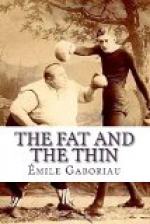They had a relation in Paris, a brother of their mother’s, one Gradelle, who was in business as a pork butcher in the Rue Pirouette, near the central markets. He was a fat, hard-hearted, miserly fellow, and received his nephews as though they were starving paupers the first time they paid him a visit. They seldom went to see him afterwards. On his nameday Quenu would take him a bunch of flowers, and receive a half-franc piece in return for it. Florent’s proud and sensitive nature suffered keenly when Gradelle scrutinised his shabby clothes with the anxious, suspicious glance of a miser apprehending a request for a dinner, or the loan of a five-franc piece. One day, however, it occurred to Florent in all artlessness to ask his uncle to change a hundred-franc note for him, and after this the pork butcher showed less alarm at sight of the lads, as he called them. Still, their friendship got no further than these infrequent visits.
These years were like a long, sweet, sad dream to Florent. As they passed he tasted to the full all the bitter joys of self-sacrifice. At home, in the big room, life was all love and tenderness; but out in the world, amidst the humiliations inflicted on him by his pupils, and the rough jostling of the streets, he felt himself yielding to wicked thoughts. His slain ambitions embittered him. It was long before he could bring himself to bow to his fate, and accept with equanimity the painful lot of a poor, plain, commonplace man. At last, to guard against the temptations of wickedness, he plunged into ideal goodness, and sought refuge in a self-created sphere of absolute truth and justice. It was then that he became a republican, entering into the republican idea even as heart-broken girls enter a convent. And not finding a republic where sufficient peace and kindliness prevailed to lull his troubles to sleep, he created one for himself. He took no pleasure in books. All the blackened paper amidst which he lived spoke of evil-smelling class-rooms, of pellets of paper chewed by unruly schoolboys, of long, profitless hours of torture. Besides, books only suggested to him a spirit of mutiny and pride, whereas it was of peace and oblivion that he felt most need. To lull and soothe himself with the ideal imaginings, to dream that he was perfectly happy, and that all the world would likewise become so, to erect in his brain the republican city in which he would fain have




